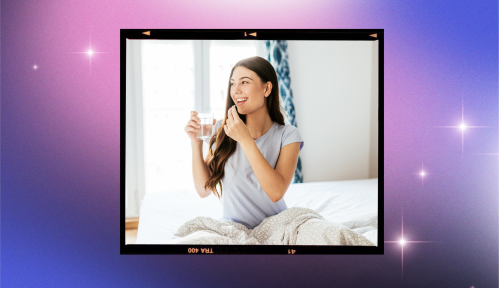Our editors independently select these products. Making a purchase through our links may earn Well+Good a commission
Optometrists Say These Are the Best OTC Eye Drops for Intense Allergies
Discover the best eye drops for allergies, recommended by optometrists. Find relief for allergy symptoms with these over-the-counter picks.
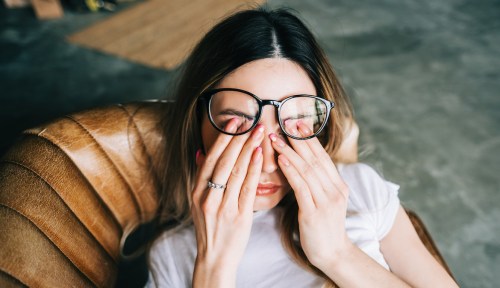
Spring gets all the credit for being allergy season, but an episode of itchy eyes can strike during any time of year—and that’s where allergy eye drops can be super helpful. An influx of air irritants (which come by way of weed pollination) usually happens from August through November, with most other trees and plants pollinating during spring. For many people, this causes an uptick in allergy symptoms, including dry, watery, and all-around uncomfortable eyes.
Experts in This Article
But according to Monica Haizen, OD, a board-certified optometrist with My Eyelab, treating your peepers with one of the best eyes drops for allergies will help you easily keep these issues at bay. Here are some of our top picks, all optometrist-recommended.
The best eye drops for itchy eyes
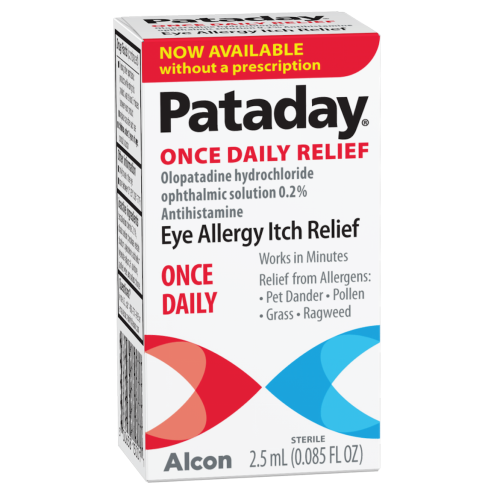
PATADAY Eye Itch Relief — $14.26
Dr. Haizen cites these as her over-the-counter drops of choice. They used to only be available with a prescription, but now you can snag them for yourself online or at your local drugstore. There’s only one active ingredient—olopatadine, an antihistamine that provides fast-acting relief from itchiness.
These small, compact eye drops come in a 2.5-ounce bottle. Users should put one drop in each eye, one time per day. The eye drops can give you up to 16 hours of relief.
“These are my preferred allergy drops because they’re usually very effective and only dosed once a day as needed, instead of multiple doses a day,” says Dr. Haizen.
Pros:
- Only have to use it once daily and provides up to 16 hours of relief
- Can be used for children 2 and older
Cons:
- Can’t be used with contact lenses
- Comes in a small bottle
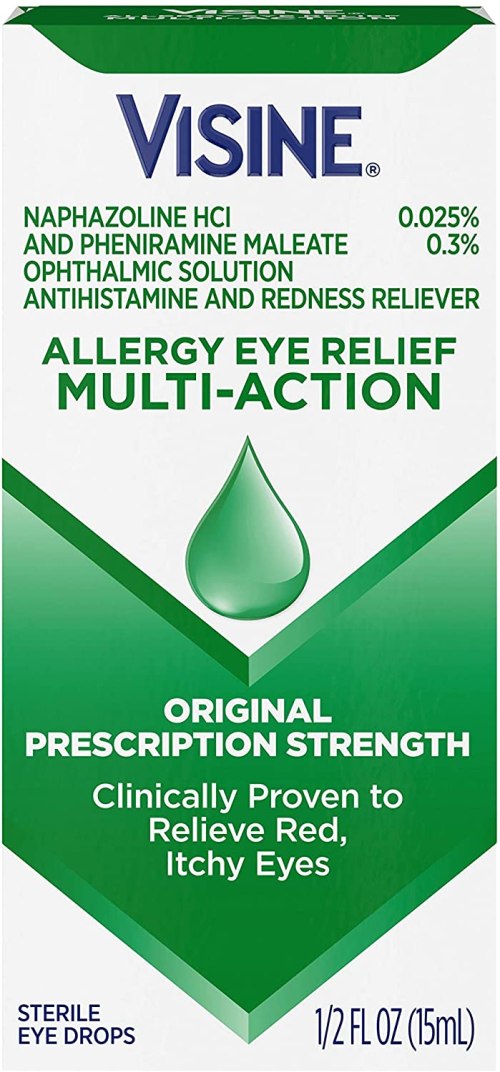
Visine Allergy Eye Relief Multi-Action Antihistamine & Redness Reliever Eye Drops — $7.48
Allergy symptoms are no match for these drops, which offer multi-action relief and are clinically proven to treat red, itchy eyes. For those reasons, they’re an optometrist-recommended choice for allergies.
These OTC eye drops have antihistamine properties (thanks to the active ingredient pheniramine maleate), which Dr. Haizen recommends, as well as 0.25 percent of naphazoline hydrochloride to help with redness. They come in a 0.5-ounce bottle, and you can get a two-pack for about $5 more.
Adults and children who are at least six years old should put one or two drops in each eye for up to four times a day. You can expect temporary relief from allergies and red eyes. According to Amazon reviews, customers say they start working immediately, but can have a slight burn when applying. They’re also effective for alleviating pet allergies.
Pros:
- Reduces both itchiness and red eyes
- Prescription strength in an OTC package
Cons:
- Can’t be used with contact lenses
- Some users may get a tingling/burning sensation in their eyes
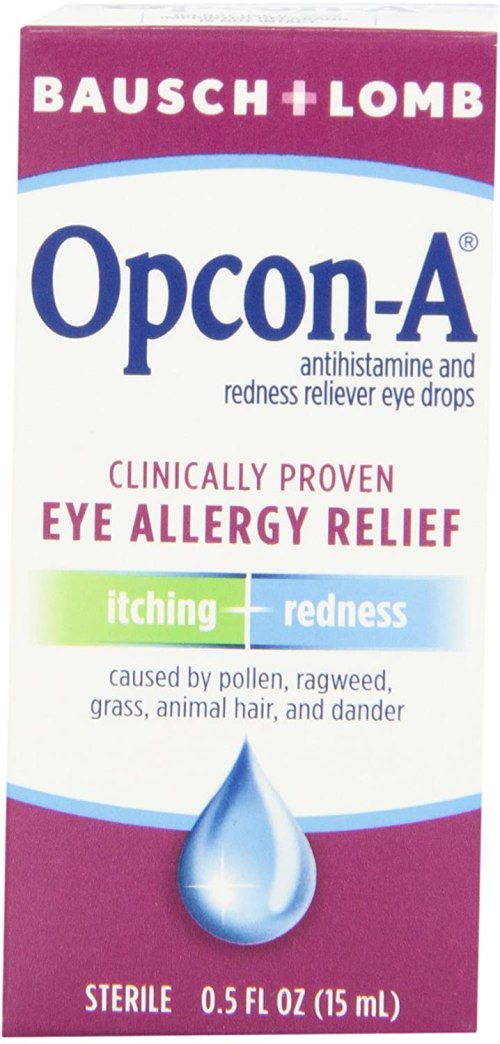
Bausch and Lomb Allergy Eye Drops — $8.00
These antihistamine eye drops have been called “the best eye drops,” especially for irritated eyes. They’re a favorite among Amazon reviewers, and as longtime user myself, I must say I agree. Whether it’s pollen or pet dander that’s got your eyes on fire, these will help relieve the burn.
They include active ingredients naphazoline and pheniramine maleate—two important ingredients to help fight allergy symptoms. This brand of eye drops comes in a 0.5-ounce bottle, so they’re easy to bring with you to use any time of day. Adults and children who are at least six years old should put one or two drops in each eye for up to four times a day for quick relief.
Pros:
- Has an antihistamine to fight allergies and a redness reliever
- Fast-working
Cons:
- Can’t be used with contact lenses
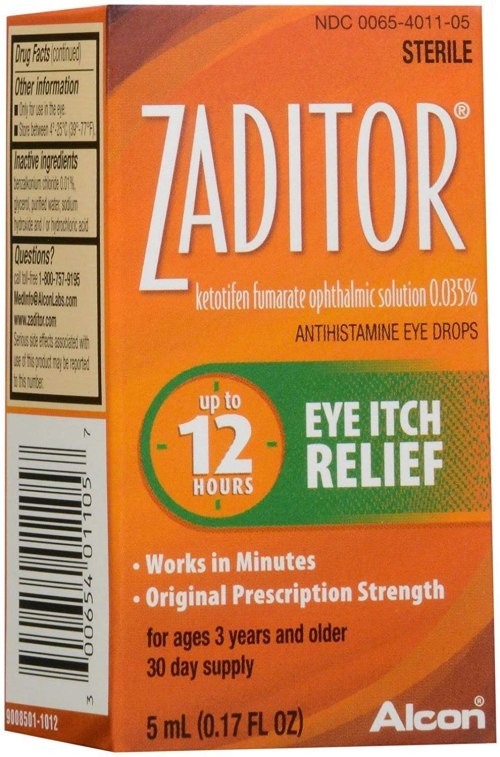
Zaditor Eye Itch Relief Antihistamine Eye Drops — $20.89
This OTC eye care formula offers 12 hours of relief from itching. Just a few drops in the morning should be enough to get you through the day—no matter how many airborne irritants you come across.
Bonus: These drops were originally prescription eye drops for allergies, but are now available over the counter. Basically, you know they’re going to be high-quality. Active ingredients include ketotifen—an antihistamine that targets itchiness.
Pros:
- Provides relief for up to 12 hours
- Fast-working
- Can be used for children 3 and up
- Comes in a two-pack, up to a 30-day supply
Cons:
- Can’t be used with contact lenses
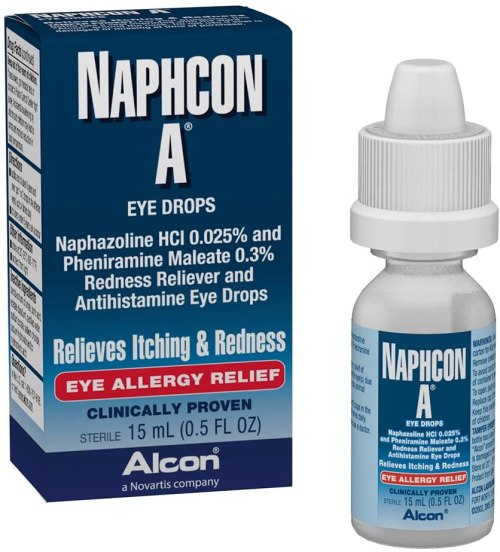
Naphcon-A Eye Drops — $10.43
These allergy-friendly eye drops pack a one-two punch for symptom relief. The active ingredients are naphazoline hydrochloride and pheniramine maleate—translation: it’s a decongestant that constricts the blood vessels in your eyes to reduce redness, paired with an antihistamine that helps with watering and itchiness.
This pocket-sized package is approximately 0.5 ounces of eye drops. Users should apply one or two drops in each eye for up to four times a day.
Pros:
- Includes a decongestant to reduce red eyes
- Can be used for children 6 and up
Cons:
- Can’t be used with contact lenses
- Can’t be used too often (up to four times daily)
Best eye drops for watery eyes
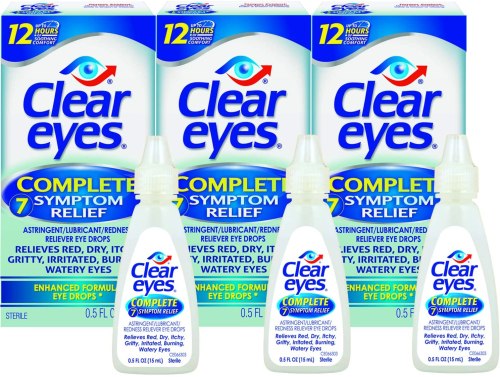
Clear Eyes Eye Drops, Complete 7 Symptom Relief (Pack of 3) — $22.96
If you have watery eyes, try this three pack of Clear Eyes for allergic conjunctivitis. These drops will help your eyes simply feel better overall, mostly due to the fact they target seven of the most common ocular allergy symptoms. Among them? Redness, dryness, itch, and—unlike the others listed above—watering.
The active ingredients that make this all possible include hypromellose and polysorbate (both lubricants), naphazoline hydrochloride for a redness reliever, and zinc sulfate as an astringent.
The drops provide up to 12 hours of intense allergy relief when you put one to two drops in each eye, up to four times daily.
Pros:
- Provides up to 12 hours of relief
- Contains both a lubricant and a redness reliever
- Comes in a three-pack
Cons:
- Can’t be used with contact lenses
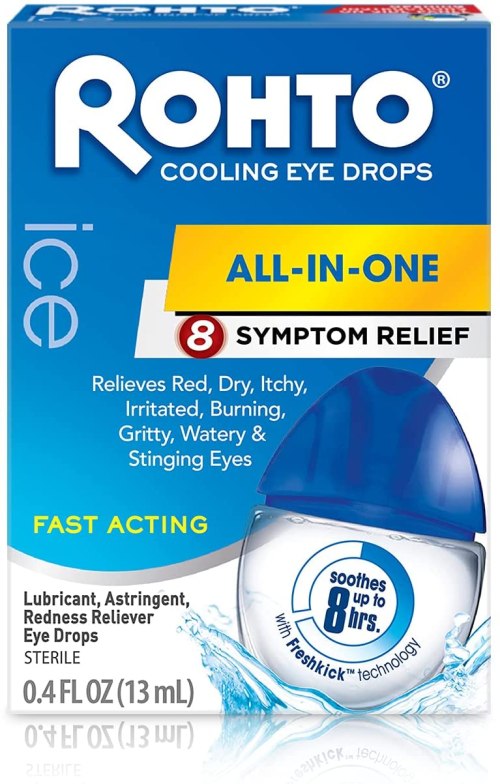
Rohto Ice All-in-One Multi-Symptom Relief Cooling Eye — $19.49
There’s nothing better than all-in-one, multi-symptom eye care for allergies. This find by Rohto gives you three 0.4-ounce bottles of cooling drops for instant comfort.
These fast-acting drops set themselves apart with “Freshkick Technology” that brings a cooling effect to the eyes. Just put one to two lubricating eye drops in each eye up to four times daily, and get up to eight hours of allergy relief.
Active ingredients are hypromellose (a lubricant), tetrahydozoline HCl (redness reliever), and zinc sulfate (astringent).
Pros:
- Provides up to 8 hours of relief
- Has a cooling sensation
- Relieves multiple symptoms, including itchy, red, irritated, and watery eyes
Cons:
- Cooling effect may irritate sensitive eyes
What causes seasonal allergies?
Different weeds pollinate at different times of the year, and depending on what you’re allergic to, you’ll likely feel seasonal allergy flares the most during that time. “Outdoor allergy causes include high mold and high pollen counts,” says Dr. Haizen. For example, ragweed and mold spores from decaying leaves are at their peak during fall, while tree pollen (pine, mulberry, etc.) tend to ramp up in the spring.
And then there’s indoor allergies—which can crop up during any time of year. “Indoor allergens like pet dander and dust mites also cause allergy flare-ups,” which is why you may see more kids sneezing and sniffling as they return to school in the fall, and spend more time indoors, says Dr. Haizen.
Symptoms of allergies
While seasonal allergies can cause symptoms throughout your body and make you feel congested and sluggish, one of the most common places they show themselves is in your eyes. People with seasonal allergies may have the following symptoms, per Dr. Haizen:
- Eye itching and itching around their eyes
- Watery eyes
- Eye redness
- Eye puffiness
- Dark circles under their eyes
If you’ve ever dealt with any of these, you know the itching, in particular, can be brutal. The reason? “Eye itching is caused by histamine released by the body after an allergic trigger is sensed,” says Dr. Haizen. “When people with allergies itch their eyes, more histamine is released and eye itching continues or increases instead of feeling relief unless medication is taken,” she adds.
These symptoms tend to last throughout the day, but if your allergies are mild, you may feel them subside once you’re indoors/away from the irritant.
What to look for in an allergy eye drop
Speaking of medication, Dr. Haizen recommends looking for antihistamine products to best treat your ocular allergy symptoms. “An effective allergy eye drop should target allergy relief, instead of just being an artificial tear, lubricating eye drop, or drop that that only targets redness,” she says.
What to consider before buying
1. Active ingredients in eye drops
As you’ll probably notice, a lot of these eye drops have similar active ingredients. And many of them have long, confusing names that could be hard to decipher. The most common active ingredients in eye drops to look for include the following, per Dr. Haizen:
- Olopatadine: an antihistamine that provides fast-acting relief from itchiness
- Naphazoline hydrochloride: helps reduce redness in the eyes
- Pheniramine maleate: an antiallergic drug, also known as an antihistamine, used to treat allergies and itchiness
- Ketotifen: an antihistamine that targets itchiness
2. Dosage
Consider how many doses of eye drops it will take to feel relief. Some of the options above require just one or two drops in each eye once per day, while others require application every few hours. How many drops you’ll need will depend on the severity of your symptoms.
3. Pre-existing health conditions
It’s always important to read the product labels carefully and talk to your doctor before using eye drops, to make sure they’re right for you. Some eye drop labels warn that people who are pregnant, have high blood pressure, heart disease, or trouble peeing should avoid using eye drops unless their doctor gives them the “okay.”
FAQ
Are allergy eye drops effective?
Eye drops can be effective for allergies, but are likely just a temporary fix for relieving symptoms. If allergies are affecting your quality of life, see your doctor to discuss treatment options. They can suggest things like daily allergy pills or immunotherapy (i.e., allergy shots). They can even recommend the best time to take allergy medicine—like the morning or at night before bed—depending on when you feel your symptoms the most.
Can you use antihistamine eye drops every day?
The length of time and frequency you can use eye drops will depend on the type you’re using, and how severe your symptoms are, per Penn Medicine Becker ENT & Allergy. Certain eye drops, like artificial tears for example, can be used every day for dryness and irritation.
But other eye drops—like antihistamine drops specifically for allergies—may have usage instructions and shouldn’t be used for long periods of time unless approved by your doctor.
What is a natural remedy for eye allergies?
If you’re looking for natural ways to relieve itchy and irritated eyes from allergies, the Cleveland Clinic recommends these strategies:
- Place a cold compress over your eyes
- Shower before bed
- Change your bedding frequently
- Close the windows in your home and car
- Use an air purifier
You can also try to drink soothing teas during allergy season, including nettle tea, green tea, or other allergy-relieving drinks like kombucha. They may help clear your sinuses and relieve a stuffy, runny nose.
Want to be the first to hear about the latest (and greatest) SHOP product drops, custom collections, discounts, and more? Sign up to have the intel delivered straight to your inbox.
Sign up for the Well+Good SHOP Newsletter
Get exclusive deals on wellness, beauty, fitness, and food products that have been hand-picked by our editors.
Got it, you've been added to our email list.




